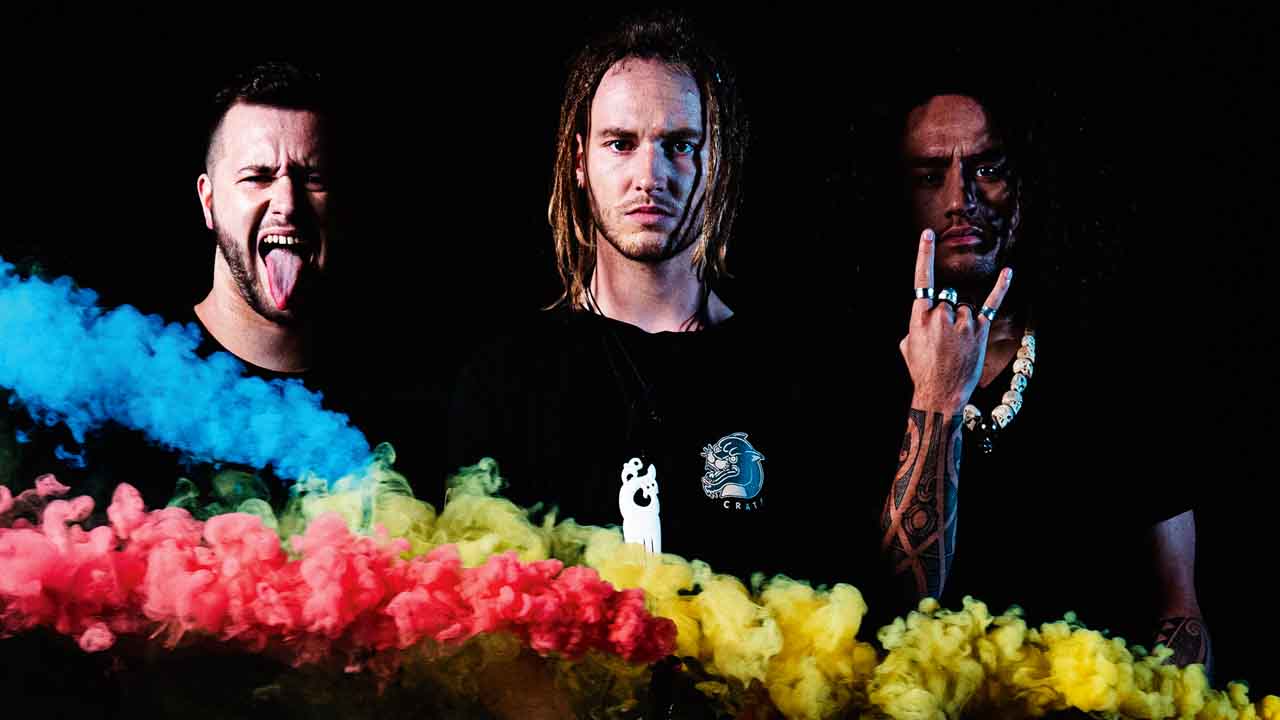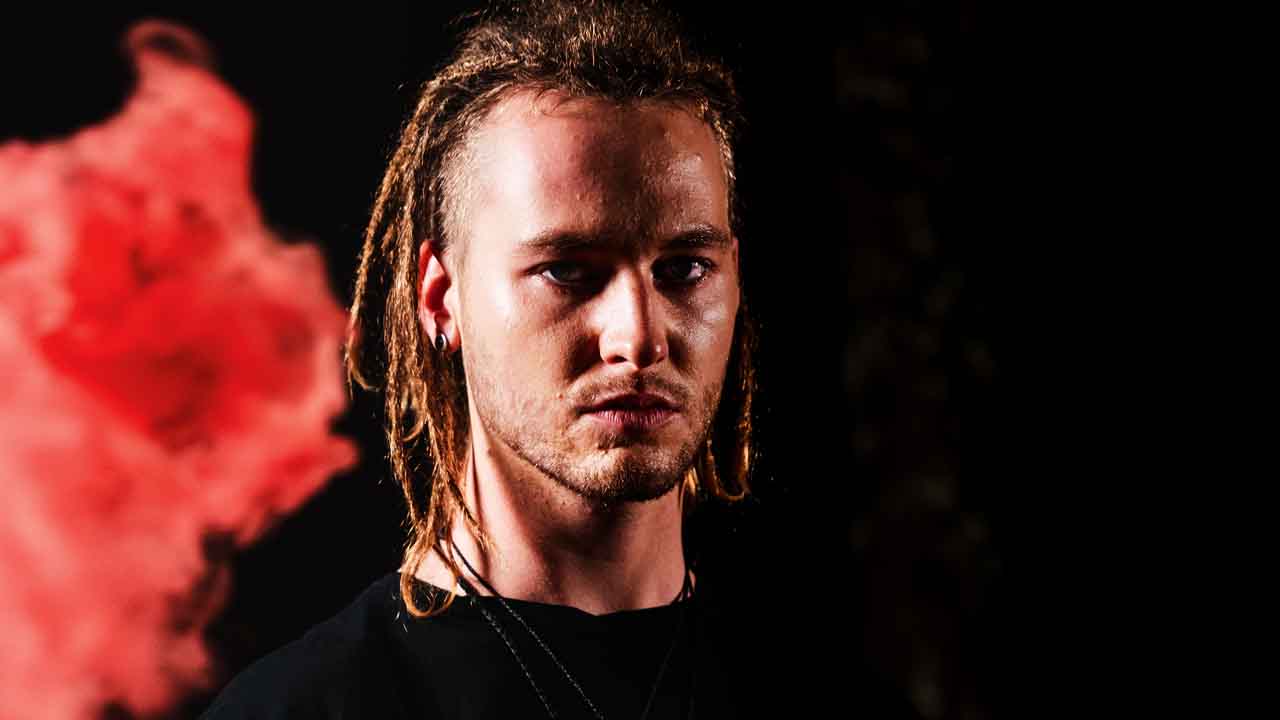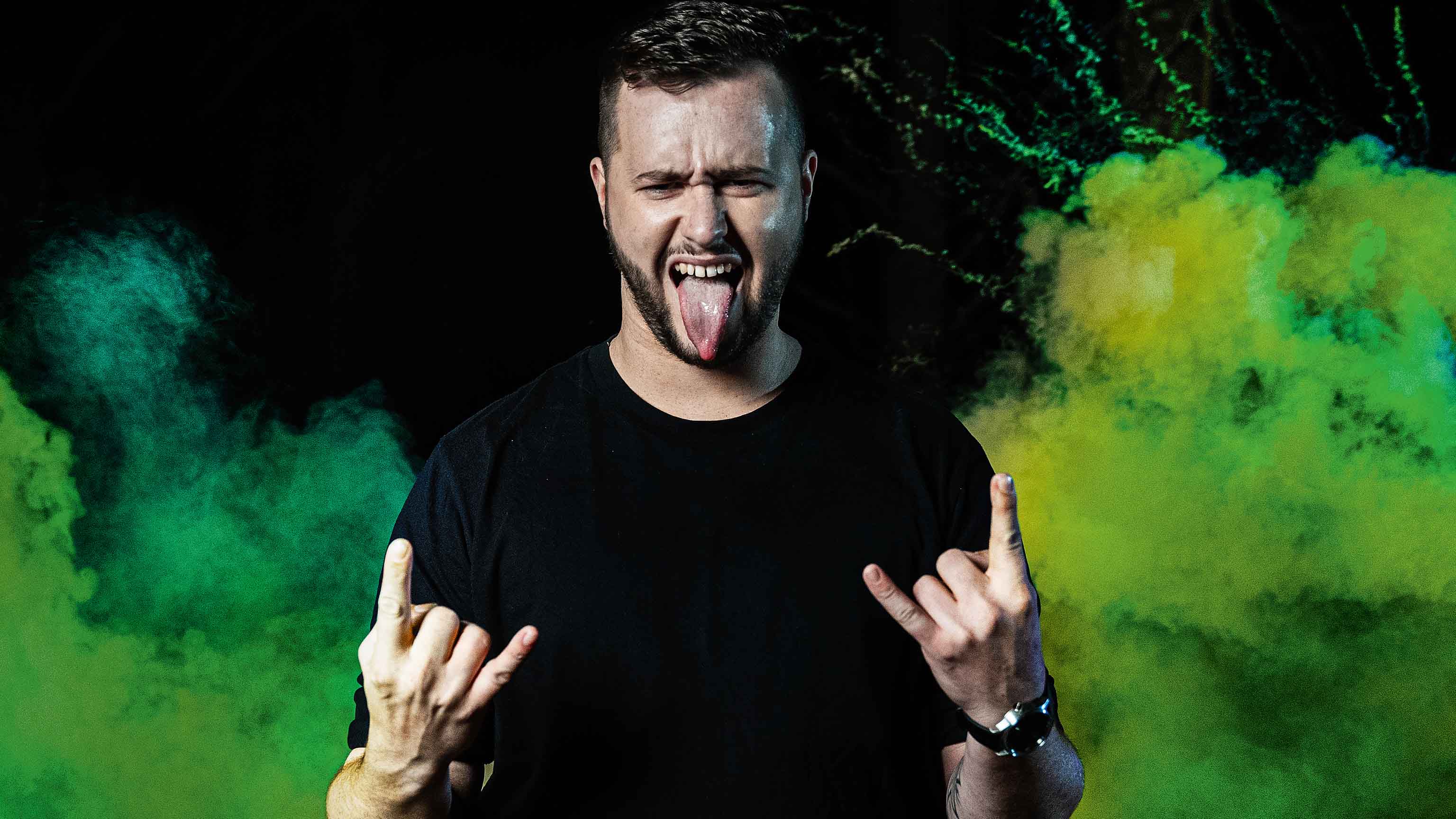Alien Weaponry: the New Zealand metal heroes bringing Māori culture to the masses
Jacinda Ardern-approved Kiwi trio Alien Weaponry are heading up a wave of new global metal. And things are only going to get heavier…

Alien Weaponry are partway through a tour of their homeland, New Zealand. Ordinarily, that would be… ordinary. But in this day and age of banned gigs, it feels strange hearing them recount their experiences of playing a tiny bar in Dunedin, down on the South Island. Like they’re in another dimension, or on another planet. The run of dates is called the Level One Tour, named after the country’s lowest, and current, Covid Alert Level.
“I think it was one of the most insane gigs we played,” enthuses frontman Lewis de Jong. “I fully saw someone’s nose busted up after the show.”
“Aw yeah, that was sideways!” adds drummer/brother Henry.
“He was so stoked. He just came up to me after the gig and then broke it the other way to fix it!”
The pair live with their partners, but today they’re at their parents’ home in the town of Waipu, a mighty 960 miles north of Dunedin. It’s still the band’s HQ, and they practise here for three days a week. Henry’s logged into Zoom in the living room, while Lewis has decamped to his bedroom “because it’s comfortable and I can lie down” (“Fair enough, eh!” smiles Henry, in a big brotherly way.) They agree it’s a mess. “It’s a wonderful, magnificent, kind of bad environment…” Lewis laughs. In other words, the room of an 18-year-old dude.
Alien Weaponry formed when Lewis was just eight and Henry was 10, and they later recruited their friend Ethan Trembath to play bass. They would go on to perform underage at bars and win national youth music competitions. But it wasn’t just their age that was remarkable; it was their talent and distinct sound, which speaks for itself. Mixing English and te reo Māori vocals with groove metal, they not only sing about their own lives, but of historic battles fought by Māori people and the injustices of colonisation. Their debut album, 2018’s Tū, begins with a monologue about their great-great-great grandfather, who fought against invading British forces. Last year, we flew out to see them play the Navajo Nation, North America’s biggest Native American reservation, where the president welcomed them into his office. Parallels between the two indigenous groups’ experiences are easily drawn.
They’ve also met New Zealand prime minister Jacinda Ardern and played around the world, including high-profile festivals such Wacken and Download. Last February, they had their biggest-ever home show at the 2,000-capacity Auckland Town Hall – no mean feat in a country that has a small population relative to its land mass. In autumn, they announced a management deal with Rick Sales Entertainment Group, which looks after the heavyweight likes of Slayer, Gojira and Mastodon. It’s fair to say they’re on the up.
Sign up below to get the latest from Metal Hammer, plus exclusive special offers, direct to your inbox!
“I feel like there’s this general interest in us because of the fact that it’s not something that people have really heard before,” explains Henry. “Of course there’s been lots of similarities drawn with Sepultura, who sing in Portuguese, and there are definitely bands that have mixed their native language and stories with metal. But I feel like we’re doing our own thing with it.”
In March, Alien Weaponry were ready to take their “own thing” to the next level with their second album. They drove two hours south to Roundhead Studios in Auckland, and had just got settled in when the government announced the country would be going into Alert Level 4 – a month-long lockdown. They packed up and returned home, trying to avoid the panic-buying shoppers who were crowding the roads in a bid to ransack the supermarkets. “I tell you what, it was a blessing in disguise,” confesses Lewis. “We didn’t have quite enough material for the amount of time we booked, and it gave us a chance to work on new songs.”

The next record builds on the unique foundation they’ve already laid down, but this time they’re delving even further back into their Māori heritage. One song is about a tale called Hatupatu And The Bird-woman, in which a teenage boy called Hatupatu is taken prisoner by a woman called Kurangaituku, who has wings on her arms, claws instead of fingers, and a beak. He escapes the confines of her cave and she gives chase, eventually burning to death in the boiling springs at Whakarewarewa on New Zealand’s North Island. That’s pretty brutal…
“It’s what some people would consider a legend, but it’s about someone who’s in our whakapapa, our lineage,” explains Henry. “We’re getting to the stories that are told to children; the slightly scary, almost fairytale-esque stories. You do get told off it you say it’s not true, because in Māori history there’s no such thing as a story that didn’t happen. When people talk about Maui pulling up New Zealand from the bottom of the ocean, with a fish hook, that just happened! It’s the way it is in Māoridom.”
If you’ve ever seen Alien Weaponry live, you’ll have seen them open the show with their family haka – a Māori war chant – from Te Ara. It conjures a fearsome atmosphere, and is something Henry clearly relishes. He reveals that he’s written his own haka for the end of this new song. “I wrote it from Hatupatu’s perspective, and having to overcome this great evil,” he explains. “It felt like quite an accomplishment because it came out sounding amazing. Every time I hear it, it gives me chills down my spine, so I hope it does that for other people as well.”
Another new song is the crushing Tangaroa, which they premiered at Auckland Town Hall. It’s named after the Māori god of the sea, and the lyrics point to the way humans are destroying the planet (‘We think we’re changing things but it’s too late / a dying creature we continue to suffocate’). We know Alien Weaponry are fans of Gojira – Henry even has a calf tattoo of the artwork from 2008’s The Way Of All Flesh – and we mention it sounds like they’re following in the band’s environmentally conscious, whale-worshipping footsteps.
“I guess it has to be a team effort,” says Henry. “We can’t just have one band that seems to give a shit about that. There’s a herd-like nature to what people do, so the more people get behind something, the more people will join. Our parents raised us to be pretty conscious of the planet and everything around us, and a big part of Māoridom is making sure that you’re not destroying Tangaroa and Tāne, which are the Māori deities of the land.”

Last autumn, the band were interviewed for a national TV news report about a wave of musicians driving an “explosion” in the use of the Māori language. It’s a movement they all feel a part of; music can shape a country’s culture, and open up conversations about difficult subjects. “A lot of people here find it hard to acknowledge that the generations of Māori oppression ever happened,” says Henry. “A lot of people find it hard to talk about because they don’t know enough to talk about it. So I guess writing music about it either makes people want to learn about it, or supplies enough information that people can.”
All the bandmembers admit that people from their demographic discuss these issues more readily. When Jason Aalon Butler from Fever 333 spoke to Hammer about the Black Lives Matter movement last year, he took a similar view that young people are challenging historic and current injustices. The bands’ stories and issues might be different, but there’s a sense in both cases that change is at hand, and could potentially be quickened by music. “Our younger generation talks about politics and worldviews a lot more openly than previous generations,” explains Henry. “Whether our music has had anything to do with that, I don’t know. But it’s cool to see.”
As for how the new songs sound? The band aren’t giving too much away, except to enthuse that they’ve honed their craft over the last few years, so we can expect greater musical proficiency and some different vocal techniques. Lewis grins. “All I can say is we’ve got a song written in Drop A tuning...”
“It’s heavy,” confirms Henry.

Work on album number two has largely been kept under wraps, but fans were taken aback in August when bassist Ethan announced he was leaving the band. In a video clip posted on Facebook, he explained he’d found it hard to be away from family and friends for prolonged periods.
“Now that we’re having to travel overseas and do big tours for months at a time, it’s quite a lot to take. Especially if you don’t like being away from home, and you need to get enough sleep, and you struggle from sensory overload, which I do from time to time,” admits Lewis. “I feel like some people just don’t enjoy that lifestyle, which is fair enough. I love Ethan as a friend and I want him to be happy.”
“Obviously me and Lewis are brothers as well, so we can be pretty intense,” adds Henry. “And we were touring with our mum and dad as well – mum being the tour manager and merch, and dad being audio. We didn’t have to deal with being homesick, because everyone was with us.”
Enter: Tūranga Morgan-Edmonds. The third and quieter member of our Zoom call today, down the road in Ruakākā. His bedroom, he assures us, is a “very tidy space”. He was two-and-a-half years into a Design degree in Wellington – the first year of which was conducted in Māori – when he got the call from his old schoolmate Henry, asking him to try out for the spot. As he’s a guitar player, he had to buy a bass to record audition videos from his lounge, before flying out to compete against a couple of other candidates on a mock stage set-up. He got the gig, but it’s meant moving 470 miles back north.
“I had to pack up everything in Wellington, drop out of uni, and make the shift back home,” he explains. “Which was alright, because they’re my parents, I’m from here, so I just had to temporarily go back to my old bedroom.”
“‘Hey mum and dad, can I move back in, because I wanna quit university?’,” chips in Lewis.
“It was a great conversation!” Tūranga laughs.
Ethan had already written and recorded the bass parts for the new album, and both contribute vocals. There’s even a song where Ethan is the main vocalist. “We’re still kind of working out how that’s going to be done live,” admits Henry. Lewis laughs. “Tūranga will have to start sounding more like Ethan!”
They’ve tested the new line-up on this tour, and the rowdy crowds and broken noses suggest Tūranga has passed with flying colours. Now all that’s left to do is get the album out, cross their fingers for a vaccine, and hope that international touring resumes soon. In the meantime, they’ve renovated their band room so they can livestream for subscribers to their new Patreon account. Alien Weaponry might be young, but they’re seriously talented, with an admirable focus that’s comparable to Trivium in the early 2000s. When we spoke to Lewis in the Navajo Nation in 2019, he revealed that his ultimate ambition for the band was to play football stadiums. Does that still hold today?
“Yeah, definitely,” he says. “But it’s about the steps you take to get there. You can’t just wish for something and not work for it.”
Adds Henry: “We have a common saying here, which is: ‘Do the mahi, get the treats.’ The ‘mahi’ is work. So: do the work, and get the treats.”
And then our call ends, and the guys head straight out the door for the next show in Wellington. Judging by their dedication and the quality of their music, they’ll soon be reaping the rewards.

Eleanor was promoted to the role of Editor at Metal Hammer magazine after over seven years with the company, having previously served as Deputy Editor and Features Editor. Prior to joining Metal Hammer, El spent three years as Production Editor at Kerrang! and four years as Production Editor and Deputy Editor at Bizarre. She has also written for the likes of Classic Rock, Prog, Rock Sound and Visit London amongst others, and was a regular presenter on the Metal Hammer Podcast.
